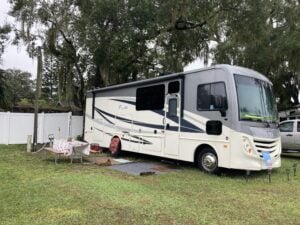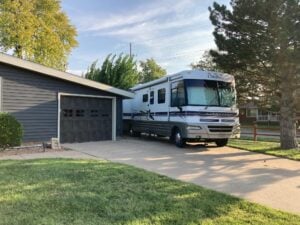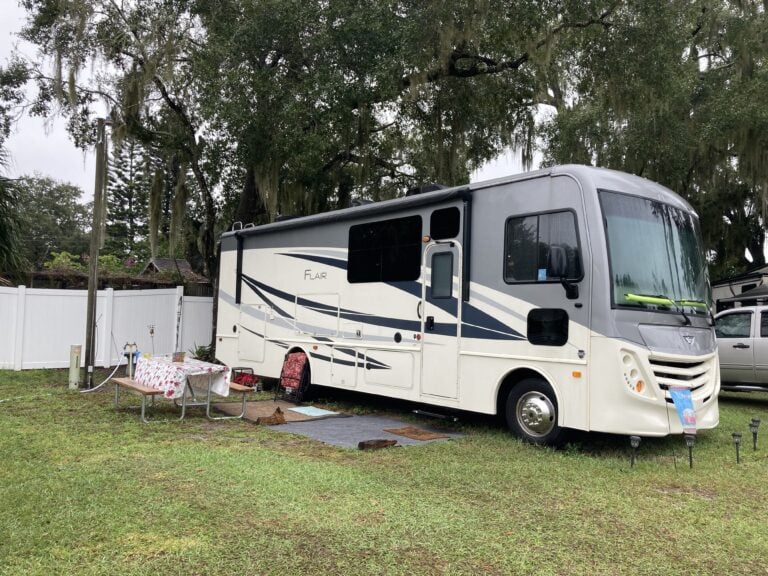This post may contain affiliate links. See our affiliate disclaimer here.
Living in an RV is a grand adventure. However, there are some practical matters that future full time RVers must address before hitting the road. One of these matters is properly establishing domicile in a county, state and country.
Establishing domicile can be a complex process when your home is mobile. Read our complete guide to RV domicile to learn why and how to establish domicile while living in an RV.
Contents
What is Domicile for Full Time RVers?

Overview
The Merriam-Webster dictionary defines domicile as “a person’s fixed, permanent, and principal home for legal purposes.”
RV domicile refers to the place full time RVers legally define as their home, when they do not have an actual house or property that serves as their permanent and principal home.
Domicile vs Residency
Residence and domicile may be used interchangeably in conversation, but legally they have different definitions. Domicile is the place one considers their permanent legal home, while residence refers to any place where a person lives.
A person can have multiple residences, but no person can have multiple domiciles. For example, a person could own homes in two different states and spend a period of time each year residing in each state.
They would have two residences. However, that person can only have domicile in one state. That domicile state would be their permanent address and controlling jurisdiction.
Why is Domicile Important for Full Time RVers?
Since traveling full time RVers move between states throughout the year, they often do not have a clear residency state. Therefore, it is important for full time RV families to establish domicile in one state so they have access to government resources and can fulfill their civic duties.
Without domicile, full time RVers would be unable to register vehicles and pay property taxes on those vehicles. Domicile also dictates where RVers pay state income taxes, serve on jury duty, vote in elections and purchase health insurance.
The Best States for RV Domicile

Factors to Consider when Selecting an RV Domicile State
There are several factors to consider when selecting a state for RV domicile. Consider each of the following topics, when deciding the best domicile location for your family.
Location of Residences
The first consideration when selecting an RV domicile state is whether or not you will retain any homes while traveling. If you do not plan to sell your current house or apartment, it may be easiest to continue using that address for domicile.
One factor for determining domicile is the place you would return to from trips. If RV life is temporary, and you will eventually end up back in your home state, that state is likely the best choice for domicile.
Length of Residency Requirements
Some states may require people to physically be in the state for specific length of time before qualifying for residency or domicile. Research your desired domicile state’s laws to see how long you must be in the state before establishing domicile.
Tax Rates
Income tax and personal property tax rates are a big consideration for many full time RVers choosing a domicile state. Alaska, Florida, Nevada, Texas, Wyoming, Washington and South Dakota are the states that do not currently have an income tax.
While establishing domicile in a state without income tax can lead to major savings, it is not always that simple. Full time RVers may also have to pay taxes in states outside of their domicile state if they live or work in another state for a large portion of the year.
RVers who plan to earn income in multiple states should consult a tax professional to understand which states they will owe income tax in.
Health Insurance
If you purchase your own health insurance, it should definitely factor into your domicile decision. Health insurance coverage options and rates vary in each state. Some states also have their own heath insurance marketplaces.
Request quotes for health coverage in your planned domicile state before making a final decision. Read our complete guide to health insurance for full time RVers for more information.
Homeschooling Laws
Future full time families should also consider homeschooling laws and regulations before selecting an RV domicile. Some states have strict regulations on homeschooling, including reporting and assessment requirements, teacher qualifications and required curriculum.
Check the required laws in your preferred domicile state against your desired homeschooling plan to make sure the state is a good fit for your family.
Vehicle Inspections
Another consideration in selecting a state for domicile is vehicle inspection requirements. Many states require an annual vehicle inspection, which means RVers have to be in the state during a certain time each year to have their vehicle inspected.
If your desired domicile requires inspections, contact the local DMV to inquire if waivers are available for travelers or if you must return each year for your inspection.
Travel Plans
While many future full time RVers prioritize financial reasons when choosing a domicile state, it is more important to choose a state where you will actually spend time.
Many states do not have specific number of days you must spend in the state to establish domicile, so it is important to chose a state where you will regularly spend time so you are able to prove honest intent if your domicile is ever challenged.
What is the Best State for RV Domicile?

Unfortunately, there is no best state for RV domicile. The best state for RV domicile varies based on families’ travel plans, jobs and homeschooling needs.
In addition to popular domicile states, future full time RVers should also consider domicile in their current state. Since you already have domicile in that state, there is no need to establish domicile somewhere else, which makes the process infinitely simpler.
Popular States for RV Domicile
While there is no best state for RV domicile, there are a few states that are popular options, including Florida, South Dakota and Texas.
All of these states have no state income tax, a low level of homeschooling regulation, their government entities accept mail-forwarding addresses and they are headquarters for mail-forwarding companies.
How to Establish RV Domicile

Since a person can only have one domicile, a person’s domicile will continue to be the place they lived before moving until they take active steps to change their domicile. If a new full time RVer wishes to change their domicile, they will need to take several steps to establish domicile in their new state.
The key factor in determining which state is your domicile is intent. When domicile is in question in a court, the court looks for the principal home which the person plans to return and remain.
Obviously, this can be a difficult determination for a person who intends to live on the road for the foreseeable future. Therefore, several steps are required to establish your intent.
Steps for Establishing RV Domicile
Step 1: Select an RV Domicile State
After reviewing the factors noted above, the first step is to choose your desired domicile state. Always include your home state in the mix when considering the best state for domicile.
It is usually easier to keep domicile in one state than to establish it elsewhere, so make sure the benefit is worth the effort before trying to change your domicile.
Step 2: Hire an Attorney
Once you have selected your desired state for RV domicile, hire an attorney from that state to review your case.
Since regulations may change and domicile is determined by intent, which can be ambiguous, it is always best to hire an attorney to ensure you properly establish your new domicile.
The attorney should guide you on the order in which the following steps should be completed and confirm if there are any additional requirements. Do not proceed with the following steps without consulting a legal professional.
Step 3: Acquire an Address in your RV Domicile
Once your have finalized a plan, it is time to acquire an address in your new domicile. If you do not own a residence or have the ability to use a family member’s address, an addresses can be obtained through a mail-forwarding company.
These companies provide addresses and mail collection services for RVers who do not have a permanent address. Ask your attorney if mail-forwarding service addresses are accepted by government entities in your new domicile state.
One option for obtaining a new address is Anytime Mailbox. The company offers mail receipt, scanning and forwarding services starting at $9.99 per month. When you sign up for an Anytime Mailbox plan, you are assigned an address that can be used for both mail and establishing domicile.
While most mail-forwarding companies only offer addresses in a few states, Anytime Mailbox offers their address service in 48 states.
Step 4: Register Vehicles in your New State
Once you have an address, you can register your RV and tow vehicles in your new domicile. This should be done quickly as many states require new residents to update their registration within 30 days of establishing residency.
Keep in mind, some states will require a vehicle inspection before a registration is granted.
Step 5: Obtain Auto and Health Insurance
Your insurance coverage will also need to be moved to your new state. Request quotes for both health and auto insurance in your new state and select your new plans.
Step 6: Apply for a New Driver’s License
RVers trying to establish domicile in a new state will also needs to surrender their old driver’s license and apply for one in their new state. RVers will need to appear in person to apply for their new driver’s license.
The exact requirements vary by state, but proof of residency will be required to obtain a new license. Consult with your domicile attorney on what documents you need to obtain before heading to the DMV.
Step 7: File an Affidavit of Domicile
An Affidavit of Domicile is a sworn statement that you file with your county testifying that you intend to domicile in a new state. With your attorney’s help, file an Affidavit of Domicile with the court in your new state.
This affidavit does not magically establish domicile, however it does help to establish intent, which may be useful if your domicile is ever challenged.
Step 8: Register to Vote
Your domicile also determines where you are allowed to vote. Once you have taken steps to establish RV domicile, register to vote in your new county.
When you register to vote, also inquire about the process for voting by absentee ballot, so you can plan accordingly for the next election.
Step 9: Update Estate and Legal Documents
While states are required to honor legal documents drawn up in another state, discrepancies in state laws may make the interpretation of out of state documents a lengthy process.
Therefore, it is best to have all legal documents, such as wills and powers of attorney, prepared or updated in your new state. Having these documents drawn up in the new state will also help to establish your intent for domicile.
Step 10: Establish a Physical Presence in your New State
Finally, it is important to establish a physical presence and community connections in your intended place of domicile. If you just spend a week in your new state completing paperwork, then never return, your previous domicile may be able to challenge your intent.
There are several ways to help properly establish your intent to make your new domicile your permanent home. First, the state should be part of your regular travel plans and visited each year or more often.
Next, create professional relationships in your domicile to help establish your intent. Find and work with doctors, dentists, financial professionals and lawyers who practice in the county of your new domicile.
If you plan on storing furniture or other possessions while you live in an RV, it is also best to store these items in your new domicile as it shows your intent for the state to be the place you would return home.
Generally, courts look at the whole of the circumstance when evaluating domicile. Any physical, community and social connections created in your new domicile will help to establish your intent and protect you from domicile challenges.
Thanks for reading our complete guide to RV domicile. If you are starting to plan for RV life, check out these 25 steps to prepare for RV living and use our RV living cost calculator to create a custom budget.
Do you have any questions about living in an RV? Drop them in the comments section below.
Happy Camping!

Christina Pate is a seasoned full-time RVer who, along with her husband Justin, has journeyed across the US, Canada, and Mexico. Drawing from her extensive travels, RV repairs and RV renovations, she founded Travels with Ted to guide and inspire fellow RV enthusiasts. Christina is also the co-author of The Owner’s Guide to RV Maintenance and the creator of My RV Log Book.

